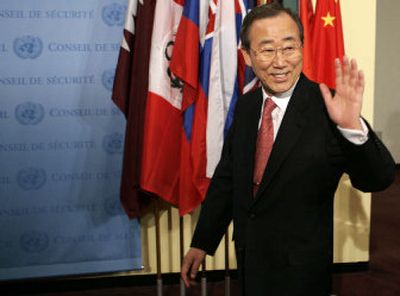U.N. head addresses capital punishment

UNITED NATIONS – On his first official day on the job, Secretary-General Ban Ki-moon stepped back from the United Nations’ long-standing opposition to the death penalty, saying capital punishment is an issue for each country to decide.
Ban’s statement contrasted sharply with his predecessors’ public rejection of the death penalty, and with the condemnation by the United Nations’ special envoy to Iraq of Saddam Hussein’s execution last weekend.
Responding to a question about the execution, Ban said the former Iraqi leader “was responsible for committing heinous crimes and unspeakable atrocities against the Iraqi people. We should never forget the victims of his crimes.”
But, he added, “The issue of capital punishment is for each and every member state to decide.
“At the same time,” he said, “I would hope that the international member states would pay due regard to all aspects of international humanitarian laws”
It was Ban’s first official statement as secretary-general. His aides spent the rest of the day trying to further explain his comments.
Michele Montas, his new spokeswoman, insisted that there was no change in U.N. policy, and that what Ban had said “was his own nuance” on the death penalty. South Korea has capital punishment, as do the United States, China and Russia, three permanent members of the Security Council.
“The U.N. policy still remains that the organization is not for capital punishment,” she said.
Human rights groups said that the death penalty was not a clear-cut issue under international law but that an optional protocol to the legally binding International Covenant on Civil and Political Rights said that the abolition of the death penalty would contribute to human dignity and rights.
At his informal news conference in front of the Security Council chamber, Ban also said that the crisis in Sudan’s Darfur region was “very high on my agenda” and that his first trip would be to an African Union summit at the end of the month in Addis Ababa, Ethiopia, where he planned to talk to Sudanese President Omar Al-Bashir.